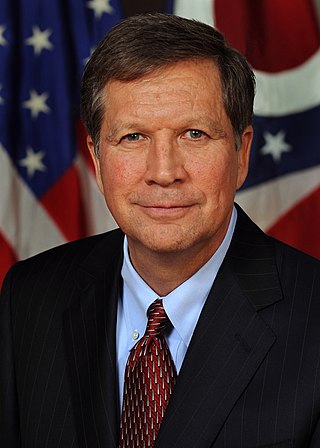School choice is a term for education options that allow students and families to select alternatives to public schools. It is the subject of fierce debate in various state legislatures across the United States.
A flat tax is a tax with a single rate on the taxable amount, after accounting for any deductions or exemptions from the tax base. It is not necessarily a fully proportional tax. Implementations are often progressive due to exemptions, or regressive in case of a maximum taxable amount. There are various tax systems that are labeled "flat tax" even though they are significantly different. The defining characteristic is the existence of only one tax rate other than zero, as opposed to multiple non-zero rates that vary depending on the amount subject to taxation.

A carbon tax is a tax levied on the carbon emissions required to produce goods and services. Carbon taxes are intended to make visible the "hidden" social costs of carbon emissions, which are otherwise felt only in indirect ways like more severe weather events. In this way, they are designed to reduce greenhouse gas emissions by increasing prices of the fossil fuels that emit them when burned. This both decreases demand for goods and services that produce high emissions and incentivizes making them less carbon-intensive. In its simplest form, a carbon tax covers only CO2 emissions; however, it could also cover other greenhouse gases, such as methane or nitrous oxide, by taxing such emissions based on their CO2-equivalent global warming potential. When a hydrocarbon fuel such as coal, petroleum, or natural gas is burned, most or all of its carbon is converted to CO2. Greenhouse gas emissions cause climate change, which damages the environment and human health. This negative externality can be reduced by taxing carbon content at any point in the product cycle. Carbon taxes are thus a type of Pigovian tax.

Arthur Betz Laffer is an American economist and author who first gained prominence during the Reagan administration as a member of Reagan's Economic Policy Advisory Board (1981–1989). Laffer is best known for the Laffer curve, an illustration of the theory that there exists some tax rate between 0% and 100% that will result in maximum tax revenue for government. In certain circumstances, this would allow governments to cut taxes, and simultaneously increase revenue and economic growth.
Tax reform is the process of changing the way taxes are collected or managed by the government and is usually undertaken to improve tax administration or to provide economic or social benefits. Tax reform can include reducing the level of taxation of all people by the government, making the tax system more progressive or less progressive, or simplifying the tax system and making the system more understandable or more accountable.

John Richard Kasich Jr. is an American politician and author who was the 69th governor of Ohio from 2011 to 2019, a member of the U.S. House of Representatives from 1983 to 2001, and a Republican candidate for the presidential nomination in 2000 and 2016.

Theodore Strickland is an American former politician who served as the 68th governor of Ohio from 2007 to 2011. A member of the Democratic Party, he previously served in the United States House of Representatives, representing Ohio's 6th congressional district.
The Tax Foundation is an international research think tank based in Washington, D.C. It was founded in 1937 by a group of businessmen in order to "monitor the tax and spending policies of government agencies". The Tax Foundation collects data and publishes research studies on U.S. tax policies at both the federal and state levels. Its stated mission is to "improve lives through tax policy research and education that leads to greater economic growth and opportunity".

In addition to federal income tax collected by the United States, most individual U.S. states collect a state income tax. Some local governments also impose an income tax, often based on state income tax calculations. Forty-two states and many localities in the United States impose an income tax on individuals. Eight states impose no state income tax, and a ninth, New Hampshire, imposes an individual income tax on dividends and interest income but not other forms of income. Forty-seven states and many localities impose a tax on the income of corporations.

The Michael E. Moritz College of Law is the law school of Ohio State University, a public land-grant research university in Columbus, Ohio. Founded in 1891, the school is located in Drinko Hall on the main campus of the Ohio State University in Columbus. The school is accredited by the American Bar Association (ABA) and is a charter member of the Association of American Law Schools.

Donald L. Plusquellic is the former mayor of Akron, Ohio. First elected in 1987, he became the 59th Mayor of Akron after previously serving 13 years on Akron City Council. Plusquellic has served his seventh term, making him the longest-serving mayor of the city. Plusquellic announced his resignation effective May 31, 2015, citing unfriendly coverage from the Akron Beacon Journal as his primary motivation.
The Council on State Taxation (COST) is a state tax organization representing business taxpayers. It has been noted by one prominent tax policy expert as the "most influential nongovernmental organization in the state tax policy arena." COST is a non-profit trade association based in Washington, D.C. consisting of approximately 550 multistate corporations engaged in interstate and international business. COST was formed in 1969 as the "Committee on State Taxation" by a handful of companies under the sponsorship of the Council of State Chambers of Commerce, an organization with which COST remains associated. In 2000, the organization changed its name to "Council on State Taxation". COST's objective is to preserve and promote equitable and nondiscriminatory state and local taxation of multijurisdictional business entities.
In the United States, individuals and corporations pay a tax on the net total of all their capital gains. The tax rate depends on both the investor's tax bracket and the amount of time the investment was held. Short-term capital gains are taxed at the investor's ordinary income tax rate and are defined as investments held for a year or less before being sold. Long-term capital gains, on dispositions of assets held for more than one year, are taxed at a lower rate.

The economy of Ohio nominally would be the 20th largest global economy behind Turkey and ahead of Switzerland according to The World Bank as of 2022. The state had a GDP of $822.67 billion in 2022, which is 3.23% of the United States total, ranking 7th in the nation behind Pennsylvania and ahead of Georgia. In 2013, Ohio was ranked in the top ten states for best business climate by Site Selection magazine, based on a business-activity database. The state was edged out only by Texas and Nebraska for the 2013 Governor's Cup award from the magazine, based on business growth and economic development.
The Buckeye Institute is a 501(c)(3) conservative, free-market public policy think tank. The organization, based in Columbus, Ohio, says its mission is "to advance free-market public policy in the states."

Universal basic income (UBI) is a social welfare proposal in which all citizens of a given population regularly receive a minimum income in the form of an unconditional transfer payment, i.e., without a means test or need to work, in which case it would be called guaranteed minimum income. It would be received independently of any other income. If the level is sufficient to meet a person's basic needs, it is sometimes called a full basic income; if it is less than that amount, it may be called a partial basic income. No country has yet introduced either, although there have been numerous pilot projects and the idea is discussed in many countries. Some have labelled UBI as utopian due to its historical origin.

The Illinois Fair Tax was a proposed amendment to the Illinois state constitution that would have effectively changed the state income tax system from a flat tax to a graduated income tax. The proposal, formally titled the "Allow for Graduated Income Tax Amendment", appeared on the ballot in the November 3, 2020 election in Illinois as a legislatively referred constitutional amendment striking language from the Constitution of Illinois requiring a flat state income tax. Concurrent with the proposed constitutional amendment, the Illinois legislature passed legislation setting a new set of graduated income tax rates that would have taken effect had the amendment been approved by voters.

A value-added tax (VAT), known in some countries as a goods and services tax (GST), is a type of tax that is assessed incrementally. It is levied on the price of a product or service at each stage of production, distribution, or sale to the end consumer. If the ultimate consumer is a business that collects and pays to the government VAT on its products or services, it can reclaim the tax paid. It is similar to, and is often compared with, a sales tax. VAT is an indirect tax because the person who ultimately bears the burden of the tax is not necessarily the same person as the one who pays the tax to the tax authorities.
A destination-based cash flow tax (DBCFT) is a form of border adjustment tax (BAT) that was proposed in the United States by the Republican Party in their 2016 policy paper "A Better Way — Our Vision for a Confident America", which promoted a move to the tax. It has been described by some sources as simply a form of import tariff, while others have argued that it has different consequences than those of a simple tariff.

The Act to provide for reconciliation pursuant to titles II and V of the concurrent resolution on the budget for fiscal year 2018, Pub. L.Tooltip Public Law 115–97 (text)(PDF), is a congressional revenue act of the United States originally introduced in Congress as the Tax Cuts and Jobs Act (TCJA), that amended the Internal Revenue Code of 1986. Major elements of the changes include reducing tax rates for businesses and individuals, increasing the standard deduction and family tax credits, eliminating personal exemptions and making it less beneficial to itemize deductions, limiting deductions for state and local income taxes and property taxes, further limiting the mortgage interest deduction, reducing the alternative minimum tax for individuals and eliminating it for corporations, doubling the estate tax exemption, and reducing the penalty for violating the individual mandate of the Affordable Care Act (ACA) to $0.












